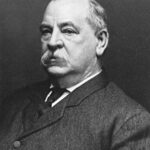President Grover Cleveland made one of America’s most controversial labor decisions during the 1894 Pullman Strike. He deployed federal troops to Chicago without state authorization. This decision sparked nationwide outrage and changed labor relations forever.
The Pullman Strike Crisis
The American Railway Union led a nationwide boycott supporting Pullman Palace Car Company workers. Railroad traffic across the nation ground to a halt. Chicago became the epicenter of labor unrest as workers protested wage cuts and high company town rents. ⚠️ Violence erupted when federal troops arrived on July 4, 1894.
Cleveland’s Military Decision
Attorney General Richard Olney urged Cleveland to intervene using federal mail protection as justification. Cleveland ordered 2,000 federal troops to Chicago despite Illinois Governor John Peter Altgeld’s strong objections. The president bypassed state authority, claiming federal responsibility for interstate commerce and mail delivery. 💰 Corporate interests heavily influenced this decision through railroad lobbying efforts.
Immediate Violent Consequences
Federal troops clashed with striking workers throughout Chicago’s rail yards. At least 30 people died in the resulting violence. Hundreds suffered injuries during the military intervention. 📊 Property damage exceeded $80 million as conflicts escalated across multiple states.
Impact:
Cleveland’s military intervention in the Pullman Strike created lasting consequences for American labor relations and federal authority. The decision fundamentally altered how future administrations approached labor disputes.
Worker Rights and Union Movement
🔥 The violent suppression radicalized many American workers against federal authority. Labor unions viewed Cleveland’s actions as corporate favoritism over worker safety. Union membership declined temporarily but later surged with renewed militancy. Eugene Debs emerged as a socialist leader after his imprisonment during the strike.
Constitutional and Legal Precedents
Cleveland’s decision established dangerous precedents for federal intervention in state affairs. Courts upheld broad federal authority over interstate commerce during labor disputes. The Supreme Court’s ruling in In re Debs (1895) expanded presidential emergency powers significantly. 📉 States’ rights advocates criticized the federal overreach for decades afterward.
Political and Economic Ramifications
Cleveland lost significant Democratic Party support, particularly among working-class voters. The 1894 midterm elections saw massive Republican gains partly due to strike backlash. Railroad companies gained increased confidence in federal protection during future labor conflicts. 🌍 International observers criticized America’s violent labor suppression methods.
Long-term Labor Relations
The intervention poisoned federal-labor relations for an entire generation of workers. Future strikes became more confrontational as workers expected violent government responses. Progressive Era reforms partially addressed these tensions through improved labor legislation.
